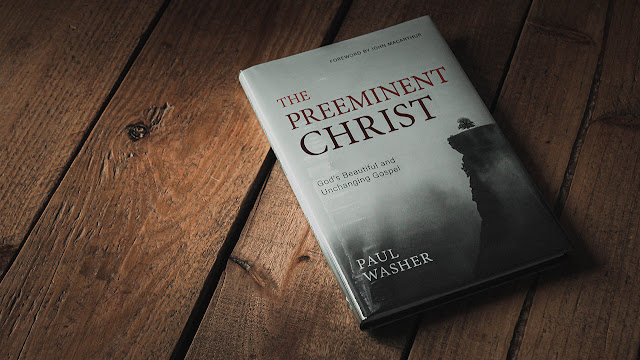Additions for the Month of March
The Preeminent Christ by Paul Washer
Much of the precious saints struggle daily in the realities of this life. But that is only because they looking at nothing else at the moment but their problems. Looking unto Jesus as the immovable rock shifts our gaze from the unstable to the stable. From despair to hope. From turmoil to comfort and rest. From wishes to the reality of Christ in God.
"This short but substantial read of 98 pages declares the unmatched
significance of the good news of Jesus Christ. Compelled by a desire for men
to know God’s love, Washer draws from the church’s greatest theologians to
herald Christ’s centrality in revelation, salvation, sanctification, study,
proclamation, and glory. The Preeminent Christ will stimulate readers to
forsake their tendency to view worldly “needs” as central by zealously seeking
this Christ in the gospel."
Barnes and Noble
Contents:
Prolegomenon
An Apology
The Essential Content of the Gospel
The Same Gospel Through The Ages
The Preeminence of the Gospel
The Preeminent Revelation of God
The Preeminent Message of Salvation
The Preeminent Means of Sanctification
The Preeminent Subject of Study
The Preeminent Subject of Preaching
The Preeminent Subject of Gloryfying
A Warning against the Neglect of the Gospel
Final Exhortation
Recommendations:
“The disciples saw Jesus shining like the sun on the Mount of Transfiguration. Today we see the glory of Christ shining in the gospel. Paul Washer lifts up our eyes to consider the supremacy of the gospel for the Christian life and ministry. Drawing from the wisdom of great preachers and teachers of the past, Washer offers a feast for the soul and a powerful exhortation to keep our eyes fixed on the gospel in all we do.”
Joel R. Beeke, president, Puritan Reformed Theological Seminary, Grand Rapids, Michigan
“As any true believer knows, Christ must be our all or our nothing. This is because of who He is as the infinitely glorious God-man and because of the indescribably wonderful salvation He has procured for us. Paul Washer does an excellent job of showing us these breathtaking realities in this Scripture-saturated and historically reinforced book. It will leave you worshiping God as your soul is saturated afresh with the unsearchable riches of Christ!”
Conrad Mbewe, pastor of Kabwata Baptist Church and founding chancellor of the African Christian University in Lusaka, Zambia
Building a Godly Home by William Gouge
For years, William Gouge's Domestical Duties has stood as the foremost Puritan treatment of Christian family life. Yet due to its size and antiquated expression, it has become almost unknown among current generations of believers. To help revive the usefulness of this classic book, Scott Brown and Joel R. Beeke divided Gouge s work into three manageable volumes, updated the language to modern standards, and have given it the title Building a Godly Home.
In the first volume, A Holy Vision for Family Life, we hear the voice of a wise and loving mentor, calling us to the old paths laid out for the family in the Bible. Here is Gouge's helpful exposition of Ephesians 5:21-6:4, where he lays out the wife's voluntary submission to her husband, the husband s sacrificial love for his wife, the child s obedient honoring of parents, and the parents nurturing leadership of their children. Reading it is like sitting down to coffee with a gentle grandfather and wise pastor. Come and allow your family to benefit from such wise counsel.
Table of Contents:
1. Serving Each Other in the Fear of the Lord
2. Particular Callings and the Wife's Submission
3. Headship in Marriage and the Church
4. Husbands and the Love of Christ
5. Love That Purifies the Unclean
6. Redeemed for Glory
7. Marital Love and Self-Love
8. Christ's Union with His Beloved
9. The Ancient Law and Unique Bond of Marriage
10. The Mystery and Practice of Marriage
11. The Child's Duties to His Parents
12. The Parents Duty towards Their Children
Amazon
The Child At Home by John S.C. Abbot
This book is intended for the children of those families to which The Mother at Home has gone. It is prepared with the hope that it may exert an influence upon the minds of the children, in exciting gratitude for their parents' love, and in forming characters which shall ensure future usefulness and happiness. The book is intended, not for entertainment, but for solid instruction. I have endeavored, however, to present instruction in an attractive form, but with what success, the result alone can tell.
The object of the book will not be accomplished by a careless perusal. It should be read by the child, in the presence of the parent, that the parent may seize upon the incidents and remarks introduced, and thus deepen the impression. Though the book is particularly intended for children, or rather for young persons, it is hoped that it will aid parents in their efforts for moral and religious instruction. It goes from the author with the most earnest prayer, that it may save some parents from blighted hopes, and that it may allure many children to gratitude, and obedience, and heaven.
Contents:
Responsibility
Deception
Obedience
Obedience II
Religious Truth
Piety
Trains of Character
About the Author:
John Stevens Cabot Abbott (September 19, 1805 – June 17, 1877), an American historian, pastor, and pedagogical writer, was born in Brunswick, Maine to Jacob and Betsey Abbott.
Owing to the success of his work, The Mother at Home, he devoted himself from 1844 onwards, to literature. He was a voluminous writer of books on Christian ethics, and of popular histories, which were credited with cultivating a popular interest in history. He is best known as the author of the widely popular History of Napoleon Bonaparte (1855), in which the various elements and episodes in Napoleon's career are described. Abbott takes a very favourable view towards his subject throughout. Also among his principal works are: History of the Civil War in America (1863–1866),History of Napoleon III Emperor of the French (1868), and The History of Frederick II, Called Frederick the Great (New York, 1871). He also did a foreword to a book called Life of Boone by W.M. Bogart, about Daniel Boone in 1876.
His biography in The Biographical Dictionary of America (1906) states that Abbot's mind was extremely clear and active, and he could leave the subject in hand for something entirely different, and then resume his former work without the slightest inconvenience, also he was blessed with a singularly even temperament; by his personal goodness, as well as by his books, he had a great influence on the world, he continued active in work nearly to the time of his death, to which he looked forward with joy rather than resignation. The anonymous author of his biography in the Encyclopædia Britannica (11th ed.) stated "He was a voluminous writer of books on Christian ethics, and of histories, which now seem unscholarly and untrustworthy, but were valuable in their time in cultivating a popular interest in history"; and that in general, except that he did not write juvenile fiction, his work in subject and style closely resembles that of his brother, Jacob Abbott.
Source:Wiki





Comments
Post a Comment